
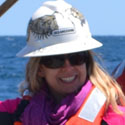
Research Benthic Ecologist, U.S. Geological Survey
Dr. Amanda Demopoulos is a Research Benthic Ecologist for the U.S. Geological Survey (USGS) at the Wetland and Aquatic Research Center in Gainesville, Florida. She received a B.S.in Oceanography from the University of Washington (1996), and M.S. (2000) and Ph.D. (2004) in Biological Oceanography from the University of Hawaii at Manoa. Her work at USGS examines the community structure and function of animals found on the seafloor or in the mud (a.k.a. sediment) within coastal wetlands, seagrass habitats, shallow and deep-sea corals, seeps, seamounts, and submarine canyon environments.
On this cruise, she will serve as chief scientist, overseeing all of the operations, including AUV Sentry dives, shipboard mapping, and sampling. Her specific research objectives will include sampling the sediments using a corer attached to the CTD rosette in order to understand the benthic communities found within canyon and seep mud. She is very excited to examine the data and images collected on the AUV Sentry dives because many of these deep-sea habitats areas have never been explored before.
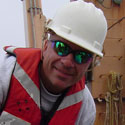
Associate Professor, Nova Southeastern University
Dr. Sutton is an Associate Professor in the Department of Marine and Environmental Sciences at Nova Southeastern University (Dania Beach, FL). His lab at the Guy Harvey Oceanographic Center specializes in oceanic ecology, with emphasis on community structure, food web modelling, biophysical coupling, biogeography, and taxonomy. He is also interested in all aspects of fish biology and ecology. He currently leads the DEEPEND consortium (Deep Pelagic Nekton Dynamics of the Gulf of Mexico ). This 80-member, 12-institution consortium is researching the structure of the deep Gulf water column, and how that structure is or may have been affected by the Deepwater Horizon oil spill. Before DEEPEND he was the lead PI of the NOAA-supported Offshore Nekton Sampling and Analysis Program (ONSAP), and co-led the Pelagic Nekton Group of the Census of Marine Life project MAR-ECO. He is currently a Steering Committee member of the Deep-Ocean Stewardship Initiative, a co-PI in the Global Ocean Biodiversity Initiative, and an invited Expert Panel Member of the United Nations World Ocean Assessment. Dr. Sutton received his Ph.D. in Biological Oceanography from the University of South Florida College of Marine Science and was a Postdoctoral Scholar at the Woods Hole Oceanographic Institution.
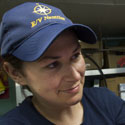
Biologist, U.S. Geological Survey
Jennifer McClain-Counts is a biologist at U.S. Geological Survey’s Wetland and Aquatic Research Center in Gainesville, FL. Jennie received her B.S. degree in Marine Biology (2006) and her M.S. degree in Marine Science (2010) from the University of North Carolina Wilmington. She is interested in the use of stable isotopes to elicit trophic relationships and currently works with Dr. Amanda Demopoulos (USGS - WARC) to examine trophic and community structure of marine fauna collected in various habitats, such as wetlands, offshore wrecks, deep-sea coral, chemosynthetic communities and submarine canyons. During the cruise, Jennie will assist with processing sediment cores, water samples and trawl samples for stable isotope analyses. This will be Jennie’s 20th offshore cruise and she is looking forward to exploring some new sites and using the AUV Sentry for the first.
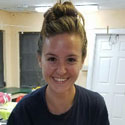
Master’s Student, Nova Southeastern University
Natalie Slayden received her B.S. in Marine Biology from Old Dominion University and is currently a student at Nova Southeastern University pursuing a Master’s in Marine Biology. At Old Dominion University, Natalie worked in Dr. Mark Butler’s Marine Ecology Lab studying the effects of climate change on the PaV1 disease in juvenile Caribbean Spiny Lobsters. Natalie is currently studying in Dr. Tracey Sutton’s Oceanic Ecology Lab at Nova Southeastern University focusing on age and growth of mesopelagic and bathypelagic fishes within the Gulf of Mexico. On this cruise, Natalie will be part of the mid-water trawl and acoustic science teams. She will be identifying fish species and will assist with active hydroacoustic monitoring. This will be her first cruise! She is very excited.
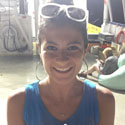
Master’s Student, Nova Southeastern University
Nina Pruzinsky is currently pursuing her Master’s degree in Marine Biology at Nova Southeastern University. She earned a B.S. in Environmental Science with minors in Marine Science and Spanish from the University of Delaware in 2015. At the University of Delaware, she worked in Dr. Mark Warner’s Algal Physiology Research Lab studying the growth patterns of various coral symbiodinium. Currently, Nina is working as a graduate research assistant in Dr. Tracey Sutton’s Oceanic Ecology Lab, focusing on deep-sea fish research in the Gulf of Mexico as a part of the DEEPEND Consortium. For her thesis, Nina is studying the faunal composition and spatiotemporal distribution of larval and juvenile tunas in the northern Gulf of Mexico from 2010 to 2017. She has participated in two ichthyoplankton cruises in the northern Gulf of Mexico the past two summers. On this cruise, Nina is a member of the mid-water trawl and acoustic science teams that are targeting the fauna found in and around the deep-scattering layers. She is assisting with deep-sea fish identifications, the management of the associated database, and the active hydroacoustic monitoring.
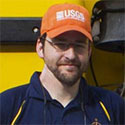
Research Geologist, U.S. Geological Survey
Dr. Jason Chaytor is a research geologist with the U.S. Geological Survey at the USGS Woods Hole Coastal and Marine Science Center. Jason graduated from Queensland University of Technology (Brisbane, Australia) in 2000 with a first-class honours degree in Geology, completed his Ph.D. in Geological Oceanography at Oregon State University in 2006, and was a postdoctoral scholar at Woods Hole Oceanographic Institution between 2006 and 2009. Jason conducts research on issues related to marine geohazards including submarine landslides, tsunamis, earthquakes, and plate tectonics and shallow- and deep-water sedimentary processes on Atlantic, Gulf of Mexico and Pacific margins of the U.S. and in the northeast Caribbean. He is the current principal scientist for the USGS Woods Hole Coastal and Marine Science Center Sediments Laboratory.
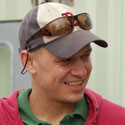
Research Engineer, Woods Hole Oceanographic Institution
Dr. Jakuba’s interests revolve around the development of underwater robotic systems in support of oceanographic science. His current projects include the development of a light-tethered ROV for under-ice telepresence (Nereid Under Ice) and the development of a vertical profiling vehicle capable of large volume in situ filtration and RNA preservation for “-omics” studies (Clio). Fifteen years ago he studied Sentry’s dynamics as a student and helped work out a control strategy for the uniquely actuated vehicle. He is excited to be out in the field with Sentry again. Dr. Jakuba is currently a Research Engineer at the Woods Hole Oceanographic Institution.
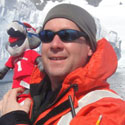
Associate Professor, Stony Brook University
Joseph Warren is an associate professor in the School of Marine and Atmospheric Sciences at Stony Brook University. He was an undergraduate engineering major and discovered underwater acoustics as a summer student researcher at the Woods Hole Oceanographic Institution. His primary research field is the use of active acoustics to measure zooplankton and fish populations, although he has also begun using passive acoustic technology to study temperate and tropical ecosystems. Current research projects in his lab include: improving our ability to get “biologically-meaningful” information from acoustic echosounders, developing acoustic scattering models for different types of scattering processes, and examining predator-prey relationships between zooplankton and their charismatic megafauna (including seabirds) consumers. His lab group conducts field surveys in a variety of ecosystems ranging from the Antarctic to the sub-Arctic and numerous locations in between. They work across a wide range of habitats from shallow (2–5 m) New York estuaries to the deep (~1-2 km) mesopelagic scattering layers in the Gulf of Mexico and study a wide variety of organisms ranging from sub-millimeter zooplankton in lakes to the foraging behavior of 100 ton baleen whales.
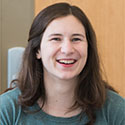
Software Engineer, Woods Hole Oceanographic Institution
Jennifer Vaccaro is a software engineer for the Sentry team at WHOI. She doesn’t have many responsibilities yet, since she only recently graduated with a B.S. in Electrical and Computer Engineering from Olin College of Engineering in Needham, MA. Her previous work experiences span a variety of STEM topics, and include projects in atmospheric chemistry, RF material characterization, and computer hardware design automation. Outside of work she enjoys hiking and singing. This will be her first cruise, hopefully of many.
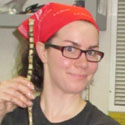
PhD Student, Temple University
Alanna Durkin is finishing up her PhD in Biology at Temple University with Dr. Erik Cordes. Her dissertation investigates the ecology of deep-sea cold seep communities around the world. In the course of her research, she has utilized computational methods to answer ecological questions by handling large datasets, modeling population dynamics, and mapping spatial distributions of seep species. Although Alanna has had the privilege of getting her hands dirty sorting animal samples on previous cruises, during this cruise her clean, dry laptop will be her primary scientific equipment as she analyzes AUV Sentry’s data. She has written her own software to annotate the submersible’s downward-looking photos and creates maps that display the habitat quality and water chemistry of selected seafloor sites. Her visualizations make it possible to see a comprehensive “bird’s-eye view” of target habitats and to analyze how benthic organisms’ distributions are defined by their physical and chemical environment.
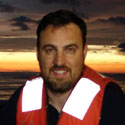
Engineer, Woods Hole Oceanographic Institution
Sean Kelley is an Engineer and part of the Sentry AUV operations group. Sean brings over 10 years of experience with deep submergence vehicles and has participated in over 60 research cruises. Sean received a Bachelor’s degree in Electrical Engineering from Wentworth Institute of Technology in Boston, MA. Sean’s first six years at WHOI were spent with the Deep Submergence Vehicle Alvin group, where he completed over 100 Alvin dives to a maximum depth of 4500 meters and participated in two Alvin overhauls. While in the Alvin group, Sean quickly reached Pilot and became the Electrical Section leader. Sean’s time with Sentry has allowed him to take on even more roles—including electrical engineering, logistics planning, cruise preparation, and expedition leader for many cruises. Sean enjoys both the at-sea aspect of research cruises as well as onshore engineering, using this expertise to fulfill the science obligations.
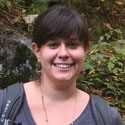
Web Coordinator, NOAA Office of Ocean Exploration and Research
Caitlin Adams is an operations coordinator with NOAA’s Office of Ocean Exploration and Research (OER). She focuses on tracking and planning OER’s non-Okeanos Explorer projects, coordinating research vessel needs across the office, and helping to plan OER’s upcoming Atlantic campaign. Before joining OER, she worked at the National Oceanographic Partnership Program, where she facilitated interagency ocean research, including the previous iteration of the BOEM-USGS-NOAA partnership, and met a number of her current colleagues. She holds a Master of Environmental Management degree from Duke University and Bachelor of Arts degree in biology from Swarthmore College. In a previous life, she worked as a biomedical researcher in New York City, which gave her a lifelong appreciation for molecular biology but not nearly enough opportunities for field work. This will be her first research cruise.
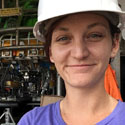
Research Technician, U.S. Geological Survey
Sarah Cahill graduated with a B.S. in wildlife ecology and conservation from the University of Florida. She works in the Benthic Ecology lab at the U.S. Geological Survey (USGS) at the Wetland and Aquatic Research Center in Gainesville, Florida as a research technician processing sediment cores looking at biodiversity and abundance in sediment communities. This will be her second cruise and she looks forward to learning more about marine field techniques and the many aspects of oceanic research. She hopes to one day pursue a M.S. in either marine sciences or mammalogy.
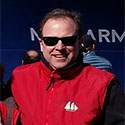
Geographer, U.S. Geological Survey
Brian Andrews is a geographer with the Seafloor Mapping Group at the US Geological Survey, Woods Hole Coastal and Marine Science Center, Woods Hole, MA. His work focuses on the collection, processing, and analysis of high-resolution marine geophysical survey data. During this project, he will be managing all the spatial data collected from the various sensors on Pisces and AUV Sentry. He graduated from Ohio Wesleyan University with a degree in Physical Geography and completed his Master’s Degree in Geography/Coastal Geomorphology at East Carolina University. In addition, Brian is a former professional mariner on sail training vessels and holds Master/Mate licenses from the US Coast Guard for vessels up to 200 tons (Near Coastal) and 1600 tons (oceans).
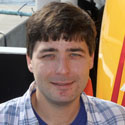
Software Engineer, Woods Hole Oceanographic Institution
Brian Andrews is a geographer with the Seafloor Mapping Group at the US Geological Survey, Woods Hole Coastal and Marine Science Center, Woods Hole, MA. His work focuses on the collection, processing, and analysis of high-resolution marine geophysical survey data. During this project, he will be managing all the spatial data collected from the various sensors on Pisces and AUV Sentry. He graduated from Ohio Wesleyan University with a degree in Physical Geography and completed his Master’s Degree in Geography/Coastal Geomorphology at East Carolina University. In addition, Brian is a former professional mariner on sail training vessels and holds Master/Mate licenses from the US Coast Guard for vessels up to 200 tons (Near Coastal) and 1600 tons (oceans).
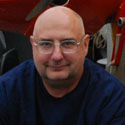
Mechanical Engineer, Woods Hole Oceanographic Institution
Andrew Billings is a mechanical engineer at Wood Hole Oceanographic. Andrew primarily works with the mechanical aspects of underwater vehicles and has about 30 years of experience designing, manufacturing, and deploying oceanographic equipment. In his free time, he enjoys small projects in his hobby machine shop.